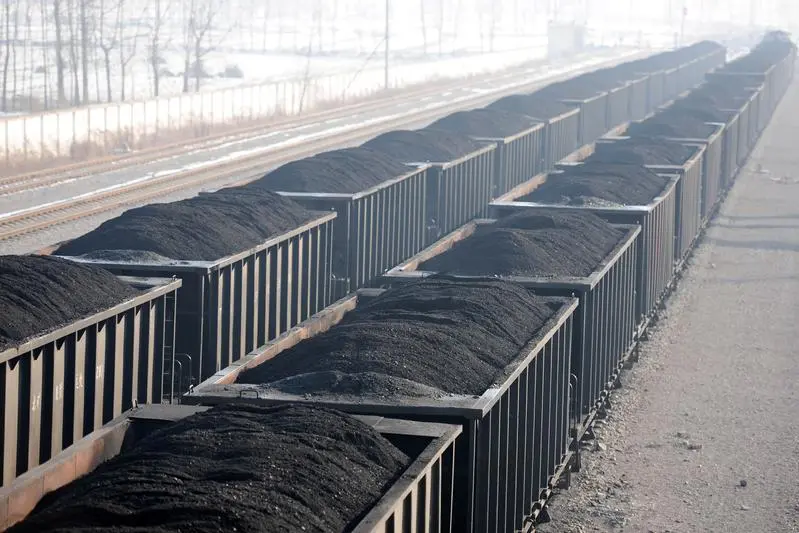PHOTO
BEIJING - China's state planner has set an immediate price target for thermal coal in its most direct intervention yet to cool the market for the key power-generating fuel amid a severe power crunch, trading and power firm sources told Reuters.
The price target was revealed at meetings on Tuesday and Wednesday between the National Development & Reform Commission (NDRC) and coal miners and distributors, as well as power firms. Chinese coal futures slumped again on Thursday and have nearly halved from a record high on Oct. 19.
The top macro planner wants to cap ex-mine pit prices for 5,500 kilocalorie thermal coal at 1,200 yuan ($187.56) a tonne, sources said, well below the 1,450-1,900 yuan a tonne price cited by traders on Wednesday in top coal producing regions of Inner Mongolia and Shanxi.
"The 1,200 yuan level appears to be the first target the NDRC is zooming in at, before pushing them further lower, maybe by another 300 or 400 yuan," said a trader, who like others interviewed by Reuters requested anonymity due to the sensitivity of the topic.
However, 1,200 yuan a tonne would still be above the break-even rate for power generators, which analysts estimated at between 600 and 1,000 yuan depending on the region.
Top state-controlled power producers Huaneng Power International and Datang International Power Generation Co 601991.SS are set to post steep falls in net income for the third quarter due to surging fuel costs.
The NDRC said Wednesday's meeting "focused on the reasonable price range and profit margin that should be maintained to promote the coordinated and sustainable development of the coal industry and downstream power industries."
It did not disclose a price level, but three major coal producers said on Wednesday they would fix ceilings for prices of thermal coal at 1,200 yuan ($188) a tonne for the winter heating season.
The most-traded thermal coal futures contract CZCcv1 on the Zhengzhou Commodity Exchange fell 13% on Thursday to 1,033.8 yuan ($161.47) per tonne, hitting the daily trading limit.
Coal futures have slumped 47.8% from a record high of 1,982 yuan on Oct. 19, falling to their lowest level since Sept. 17. They are still up nearly double for the year.
HOLD PRICES LOWER
"There have been meetings almost every single day. The message is clear - to hold the prices down, said a Beijing-based analyst.
"We're anticipating Beijing to take unprecedented steps to ease the power/coal crisis, though the power rationing risk may persist over the winter while coal price may continue going down from current level."
In the longer-run, the NDRC on Wednesday proposed benchmark guidance of 440 yuan per tonne at ex-pit levels, with an allowed 20% upward float, according to several sources with knowledge of the discussions.
The NDRC did not immediate respond to a request for comment on the target prices.
Local authorities will be responsible for guiding the prices that coal dealers and distributors charge retail consumers as well as intervening where necessary, the sources added.
The more aggressive price targets, which some traders said would be difficult to achieve, are designed to last through this winter but are pending a final nod from the Chinese State Council, or cabinet, sources said.
Wednesday's meeting also aimed to identify firms deliberately inflating coal prices, the state planner said.
Along with the market regulator, it has sent four teams to carry out "special supervision" of spot coal prices in the top three production regions.
These are the provinces of Shanxi, Shaanxi and Inner Mongolia and the major coal port of Qinhuangdao in the central province of Hebei, among northern ports.
On Tuesday, the planner said it was studying a new mechanism to guide thermal coal prices into a reasonable range over the long run.
On Wednesday, the State Council said it would defer taxes of about 17 billion yuan in the fourth quarter to help coal and heating firms resolve operational woes, and also ease taxes on some manufacturing firms. ($1=6.4023 Chinese yuan renminbi)
(Reporting by Shivani Singh, Aizhu Chen, Muyu Xu and Gabriel Crossley; Editing by Clarence Fernandez, Christian Schmollinger and Richard Pullin) ((ShivaniSingh2@thomsonreuters.com; +86 10 5669 2115;))





















